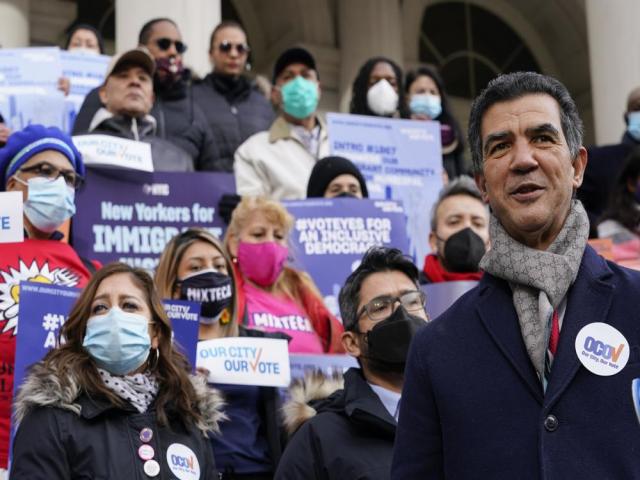Watershed moment in NYC: New law allows noncitizens to vote

More than 800,000 noncitizens and “Dreamers” in New York City will have access to the ballot box — and could vote in municipal elections as early as next year — after Mayor Eric Adams allowed legislation to automatically become law Sunday.
American Underdog: The Kurt Warner Story
Opponents have vowed to challenge the new law, which the City Council approved a month ago. Unless a judge halts its implementation, New York City is the first major U.S. city to grant widespread municipal voting rights to noncitizens.
More than a dozen communities across the U.S. already allow noncitizens to cast ballots in local elections, including 11 towns in Maryland and two in Vermont.
Noncitizens still wouldn’t be able to vote for president or members of Congress in federal races, or in the state elections that pick the governor, judges and legislators.
The Board of Elections must now begin drawing an implementation plan by July, including voter registration rules and provisions that would create separate ballots for municipal races to prevent noncitizens from casting ballots in federal and state contests.
It’s a watershed moment for the nation’s most populous city, where legally documented, voting-age noncitizens comprise nearly one in nine of the city’s 7 million voting-age inhabitants. The movement to win voting rights for noncitizens prevailed after numerous setbacks.
The measure would allow noncitizens who have been lawful permanent residents of the city for at least 30 days, as well as those authorized to work in the U.S., including “Dreamers,” to help select the city’s mayor, city council members, borough presidents, comptroller and public advocate.
“Dreamers” are young immigrants brought to the U.S. illegally as children who would benefit from the never-passed DREAM Act or the Deferred Action for Childhood Arrivals program, which allows them to remain in the country if they meet certain criteria.
The first elections in which noncitizens would be allowed to vote are in 2023.
“We build a stronger democracy when we include the voices of immigrants,” said former City Councilmember Ydanis Rodriguez, who led the charge to win approval for the legislation.
Rodriguez, who Adams appointed as his transportation commissioner, thanked the mayor for his support and expects a vigorous defense against any legal challenges.
Adams recently cast uncertainty over the legislation when he raised concern about the monthlong residency standard, but later said those concerns did not mean he would veto the bill.
While there was some question whether Adams could stop the bill from becoming law, the 30-day time limit for the mayor to take action expired at the stroke of midnight.
Adams said he looked forward to the law bringing millions more into the democratic process.
“I believe that New Yorkers should have a say in their government, which is why I have and will continue to support this important legislation,” Adams said in a statement released Saturday night. He added that his earlier concerns were put at ease after what he called productive dialogue with colleagues.
Former Mayor Bill de Blasio had similar concerns but did not move to veto the measure before vacating City Hall at the end of the year.
Opponents say the council lacks the authority on its own to grant voting rights to noncitizens and should have first sought action by state lawmakers.
Some states, including Alabama, Arizona, Colorado and Florida, have adopted rules that would preempt any attempts to pass laws like the one in New York City.
Former Mayor Bill de Blasio had similar concerns but did not move to veto the measure before vacating City Hall at the end of the year.
Opponents say the council lacks the authority on its own to grant voting rights to noncitizens and should have first sought action by state lawmakers.
Some states, including Alabama, Arizona, Colorado and Florida, have adopted rules that would preempt any attempts to pass laws like the one in New York City.
Illinois officials are seeking answers after the killing last week of a state child welfare worker during a home visit — the second such tragedy to occur in less than five years.
Deidre Silas, an investigator with the Illinois Department of Children and Family Services, was stabbed to death last Tuesday when she responded to a call of possible endangerment of children in a home in the central Illinois town of Thayer.
A man related to one or more of the six children who were at home at the time, 32-year-old Benjamin Reed, is being held in the Sangamon County Jail without bond on first-degree murder and other charges. An attempt by The Associated Press to reach Reed’s attorney on Friday was unsuccessful.
Silas’ death is the second time in four-and-a-half years that state officials and the social work community are asking what should have been done, but wasn’t, to prevent it. DCFS investigator Pamela Knight, 59, died following a brutal beating while attempting to remove an endangered child from his father in September 2017.

Future of prayer site in doubt under Israel’s fragile govt
- When Israel’s new government took office last June, it indicated it would press ahead on an egalitarian prayer site at Jerusalem’s Western Wall

Former anti-terror chief arrested over Kazakhstan protests
- The former head of Kazakhstan’s counterintelligence and anti-terror agency has been arrested on charges of attempted government overthrow

Bipin Rawat: Indias top general dies in helicopter crash
- Indias top military commander has died in a helicopter crash in the southern Indian state of Tamil Nadu, the air force says.

Humanity needs to ditch coal to save itself. It also needs to keep the lights on.
- Humanity needs to ditch coal to save itself. It also needs to keep the lights on...